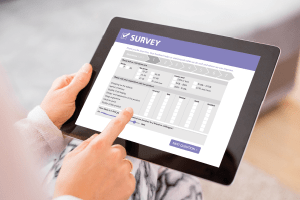 Californians are taking the COVID-19 pandemic seriously, and expect their elected leaders to do the same.
Californians are taking the COVID-19 pandemic seriously, and expect their elected leaders to do the same.
The sixth annual California Chamber of Commerce poll, The People’s Voice, 2020, found that voters are keenly aware of the widespread effects of the pandemic.
Nearly half of all voters have suffered an economic impact: reduced work hours, lost job, pay cut, or unpaid leave. More than six months after California first began shutting down its economy, nearly half of voters report their workplace is still not operating normally; instead, employers have reduced services, closed temporarily or permanently, or are operating online only.
This perception extends to their communities. Nearly half of voters report “a lot of businesses” shut down in their communities, and nearly 6 in 10 report “a lot of jobs lost.”
Split on Future Direction
The bottom line: voters are deeply split over which direction to take in addressing economic recovery: just over half want to continue to safely reopen businesses to stabilize the economy and preserve jobs, while just under half want to return to tougher restrictions in order to limit the spread of the virus.
The demographics of this issue reflect the health and economic effects. The strongest proponents of tougher restrictions are young people, Hispanics and residents in the Los Angeles area.
Strongest proponents of safely reopening to stabilize the economy are older voters, Republicans and residents of San Diego/Orange counties and the Central Valley.
Nearly 7 in 10 voters are concerned about the risks that they or their immediate family members face from working outside the home during the pandemic, with half of them very concerned. More promising, voters seem satisfied with the efforts their employers are taking to keep them safe, with more than half reporting their employers are doing “a lot” to protect them from contracting COVID-19, and another third reporting employers are doing “some” COVID-19 protection.
Nonetheless, voters remain pessimistic about our economic recovery. Half of voters believe “the worst is yet to come” regarding the economic impact of COVID-19, such as businesses shutting down, while only 1 out of 7 voters believe that “the worst is behind us.”
The inescapable conclusion is that elected leaders will be judged on their response to COVID-19. Governor Gavin Newsom’s approval ratings have eroded slightly since the summer. He retains today a 50% – 50% excellent/good v. fair/poor rating, down from a 57% – 43% margin in just the four months since July.
Need to Update Labor Laws
An obvious starting point for directly addressing some of the issues related to reopening the economy would be to update labor laws to reflect facts on the ground.
Because of the pandemic, many Californians are currently working from home, many with school-age children who are taking remote learning, and many lack adequate child care.
Telecommuting has become the new normal—and could very well become entrenched long after the pandemic is brought to heel.
Voters overwhelmingly agree (86%, 42% strongly) that the state’s labor laws should be changed so that employees working from home have more flexible hours as well as relaxed meal and break times.
What’s more, having had a taste of telecommuting, voters agree (92%, 55% strongly) with policies that would make it easier for businesses to allow employees to telecommute under a variety of conditions—not just during a pandemic emergency—such as for employees with school-age children, those without child care, and to encourage more work-from home to reduce commutes and highway congestion and cut greenhouse gas emissions.
Voters are also very concerned about the effects of the pandemic on public schools, and are looking to state leaders for better guidance. Those polled agree that distance learning is an effective way to contain the spread of COVID-19, but are very concerned (87%, 48% strongly) that distance learning is almost impossible for poor or disadvantaged public school students without access to computers or internet.
Voters agree (85%, 53% strongly) that Governor Newsom and state leaders should provide specific guidance on how and when schools can reopen. They also crave more information (87%, 42% strongly) about how public schools are teaching their children and about educational alternatives to traditional public schools.
Methodology
The CalChamber poll was conducted by Core Decision Analytics and Pierrepont Analytics with online interviews from November 6–9, 2020, with 1,009 online interviews of California
2020 general election voters. The margin of error for this study is +/- 3.1% at the 95% confidence level and larger for subgroups. This is the sixth year CalChamber has published a voter survey.
Contact: Loren Kaye


